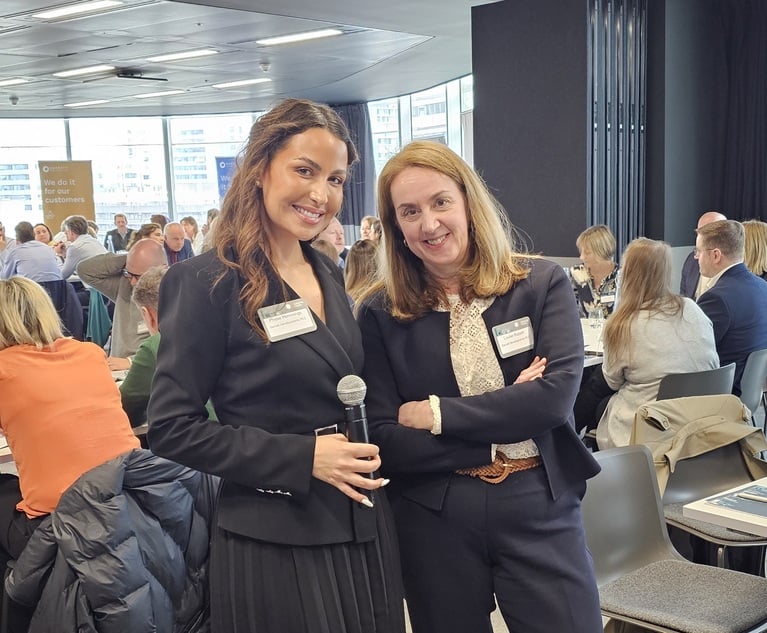Red Cross code
At first glance, Michael Meyer's daily routine - which sees him work 8am to 9pm out of offices in Moorgate in central London, punctuated with frequent business trips abroad - is much like that of a partner at a major law firm or senior in-house lawyer at a FTSE 100 company. But the days of the British Red Cross' head of international law are filled with rather different concerns.
December 07, 2010 at 01:58 AM
6 minute read
British Red Cross head of international law Michael Meyer tells Alex Aldridge how he came to a job that allows him to contribute to peace talks in the Middle East
At first glance, Michael Meyer's daily routine – which sees him work 8am to 9pm out of offices in Moorgate in central London, punctuated with frequent business trips abroad – is much like that of a partner at a major law firm or senior in-house lawyer at a FTSE 100 company. But the days of the British Red Cross' head of international law are filled with rather different concerns.
Currently Meyer is liaising with the UK Government on possible agenda items for the 31st International Conference of the Red Cross and Red Crescent – part of his role assisting in the continual evolution of international law in a way consistent with his organisation's objectives. "The International Committee of the Red Cross has identified some key areas with regard to recent armed conflicts where the law could be clarified or developed. In a small way I'm hoping to contribute to this exercise," he says.
At a previous conference in 2006, Meyer assisted in the amendment of the Red Cross' internal rules to admit the Israeli and Palestinian branches of the organisation. Previously, they had been refused membership – in the case of the Israelis, because they would not use the cross or crescent emblem; in the Palestinians' case, because the territory wasn't officially recognised as a state. "It was the most memorable day of my career," recalls Meyer. "With the British Red Cross delegation playing a leading role in reminding other delegations of our fundamental principles, I felt we had made a small contribution to the Middle East peace process."
Growing up in Los Angeles during the 1960s, this wasn't the kind of thing Meyer expected to be involved in. "My father, who was in the entertainment industry and had lived through the Depression of the 1930s, just wanted me to have a secure occupation – ideally as a corporate lawyer in the US rather than as a lawyer specialising in humanitarian law working out of London," he says. Interested in politics and history, Meyer read American studies at Yale University before moving to the UK to study law at Cambridge. After graduating in 1982, he got a job as a researcher at the Red Cross.
Twenty-eight years later, he is still there, picking up an honorary OBE for outstanding services in the field of international law as he climbed the ranks. "One of my lecturers at Cambridge, Professor Clive Parry, once described me as a 'Red Cross man' – and I guess he was right," Meyer says, citing a passion for humanitarian issues and interest in world affairs as the reasons behind his continuing enthusiasm for the job. "If I wasn't reading about international law at work I'd be doing so in my free time; it's an interest," he adds.
Not that Meyer's job is all fascinating international law conundrums and glitzy conferences. A major part of his role is advising on the misuse of the Red Cross emblem – a problem for the organisation due to the incorrect assumption made by many that it is a generic symbol. Because of the emblem's status as the visible sign of protection under the 1949 Geneva Convention, its unauthorised use is a criminal offence. As a result, enforcement is taken seriously. "The organisation's UK volunteers play a major role in bringing misuse of the emblem to our attention," says Meyer, adding that in the past, several personal injury law firms have mistakenly used the symbol.
As an organisation with an annual income of £182m and employing 3,390 staff (and which benefits from the services of 28,208 volunteers), the British Red Cross also generates large amounts of business and finance-related matters. The legal aspects of these are handled by Meyer's colleague, Andrew Napier, who heads up a team of two lawyers and seven staff, and regularly seeks external advice from law firms Withers and Wilsons on general corporate and charity law-related matters (Simmons & Simmons, Wragge & Co and Bird & Bird assist on a pro bono basis with IT, data protection and intellectual property respectively).
A former Freshfields Bruckhaus Deringer lawyer, Napier joined the Red Cross 15 years ago after a spell volunteering for the organisation, having left private practice. He believes that as charities continue to become more business-like there will be growing opportunities for corporate lawyers looking to move into the voluntary sector. "Increasingly, the top-end charities are employing in-house legal teams and they need quality people," he says.
The very different skills involved in international public law and corporate law mean there is little crossover between Napier's and Meyer's teams – although both have a shared mindset which places contributing towards the greater good above individual financial rewards. "The salaries in the voluntary sector are perfectly respectable, but obviously nothing like corporate law firm rates," says Napier. For example, an international law adviser position in Meyer's team, which requires a high level of specialist knowledge and several years of experience as a lawyer in government, is currently being advertised for £35,000.
Such sums might not be enough to pay the mortgage on a family home in Surrey, but for lawyers without such concerns, the Red Cross represents, as Meyer puts it, the opportunity to pursue "a vocation rather than just a job".
———————————————————————————————————————————————–
The red cross – An A&O connection
Not only does the British Red Cross work with commercial firms Simmons & Simmons, Wragge & Co and Bird & Bird on a pro bono basis on corporate legal matters, but it is in a long-term partnership with magic circle outfit Allen & Overy (A&O) to deliver an education resource for the teaching of international humanitarian law in schools.
A&O senior partner David Morley describes the arrangement – in operation since last year – as "a perfect fit with our pro bono and community affairs work, which is based on the principles of justice and fair treatment".
In September two schools won a competition run jointly by the organisations to demonstrate their knowledge of issues related to the themes of justice and fairness, with topics covered including child soldiering and terrorism.
This content has been archived. It is available through our partners, LexisNexis® and Bloomberg Law.
To view this content, please continue to their sites.
Not a Lexis Subscriber?
Subscribe Now
Not a Bloomberg Law Subscriber?
Subscribe Now
NOT FOR REPRINT
© 2025 ALM Global, LLC, All Rights Reserved. Request academic re-use from www.copyright.com. All other uses, submit a request to [email protected]. For more information visit Asset & Logo Licensing.
You Might Like
View All
Broadcom Hires From Nuclear Giant to Appoint French Legal Head

GCs Say They are Getting 'Edged Out' of UK Boardrooms

'I Won’t Name the Firm, But...'—Barratt Redrow's Legal Head on External Counsel Red Flags
Trending Stories
- 1Deep-Seated Legal Department Woes—From Data in Disarray to Communication Dysfunction—Threaten to Temper Gen AI's Transformative Powers
- 2Josef Partners with NYU, Housing Court Answers to Launch AI Assistant Built for Tenants
- 3How a C-Section 'Scheduling Error' Led to a $17M Settlement
- 4Judge Louis C. Bechtle: An American Jurist Who Relied on Common Sense, Sound Judgment and Fairness
- 5Send Us Your New Partners for the NJ Law Journal's New Partners Yearbook
Who Got The Work
Michael G. Bongiorno, Andrew Scott Dulberg and Elizabeth E. Driscoll from Wilmer Cutler Pickering Hale and Dorr have stepped in to represent Symbotic Inc., an A.I.-enabled technology platform that focuses on increasing supply chain efficiency, and other defendants in a pending shareholder derivative lawsuit. The case, filed Oct. 2 in Massachusetts District Court by the Brown Law Firm on behalf of Stephen Austen, accuses certain officers and directors of misleading investors in regard to Symbotic's potential for margin growth by failing to disclose that the company was not equipped to timely deploy its systems or manage expenses through project delays. The case, assigned to U.S. District Judge Nathaniel M. Gorton, is 1:24-cv-12522, Austen v. Cohen et al.
Who Got The Work
Edmund Polubinski and Marie Killmond of Davis Polk & Wardwell have entered appearances for data platform software development company MongoDB and other defendants in a pending shareholder derivative lawsuit. The action, filed Oct. 7 in New York Southern District Court by the Brown Law Firm, accuses the company's directors and/or officers of falsely expressing confidence in the company’s restructuring of its sales incentive plan and downplaying the severity of decreases in its upfront commitments. The case is 1:24-cv-07594, Roy v. Ittycheria et al.
Who Got The Work
Amy O. Bruchs and Kurt F. Ellison of Michael Best & Friedrich have entered appearances for Epic Systems Corp. in a pending employment discrimination lawsuit. The suit was filed Sept. 7 in Wisconsin Western District Court by Levine Eisberner LLC and Siri & Glimstad on behalf of a project manager who claims that he was wrongfully terminated after applying for a religious exemption to the defendant's COVID-19 vaccine mandate. The case, assigned to U.S. Magistrate Judge Anita Marie Boor, is 3:24-cv-00630, Secker, Nathan v. Epic Systems Corporation.
Who Got The Work
David X. Sullivan, Thomas J. Finn and Gregory A. Hall from McCarter & English have entered appearances for Sunrun Installation Services in a pending civil rights lawsuit. The complaint was filed Sept. 4 in Connecticut District Court by attorney Robert M. Berke on behalf of former employee George Edward Steins, who was arrested and charged with employing an unregistered home improvement salesperson. The complaint alleges that had Sunrun informed the Connecticut Department of Consumer Protection that the plaintiff's employment had ended in 2017 and that he no longer held Sunrun's home improvement contractor license, he would not have been hit with charges, which were dismissed in May 2024. The case, assigned to U.S. District Judge Jeffrey A. Meyer, is 3:24-cv-01423, Steins v. Sunrun, Inc. et al.
Who Got The Work
Greenberg Traurig shareholder Joshua L. Raskin has entered an appearance for boohoo.com UK Ltd. in a pending patent infringement lawsuit. The suit, filed Sept. 3 in Texas Eastern District Court by Rozier Hardt McDonough on behalf of Alto Dynamics, asserts five patents related to an online shopping platform. The case, assigned to U.S. District Judge Rodney Gilstrap, is 2:24-cv-00719, Alto Dynamics, LLC v. boohoo.com UK Limited.
Featured Firms
Law Offices of Gary Martin Hays & Associates, P.C.
(470) 294-1674
Law Offices of Mark E. Salomone
(857) 444-6468
Smith & Hassler
(713) 739-1250







